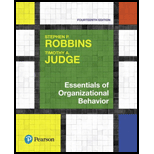
To explain: The way job characteristics model (JCM) motivates by altering the work environment.
Explanation of Solution
Way job characteristics model (JCM) motivates by altering the work environment:
The job characteristics model defines a job in five major aspects which help to motivate the employees. They are:
Skill variety:
The degree of different types of skills required for a job makes the job interesting and motivates the employees. The idea of performing the same job in the same way for longer periods will decrease motivation.
Task identity:
It is the level of complete work a person does. If the person only does a part of a work it does not give the required satisfaction.
Task significance:
The significance is the impact of the task performed by an individual on the lives of others. The increased impact will provide more motivation.
Autonomy:
It is the independence given to the worker on deciding on how the work is being carried out. The freedom to make decisions and so on.
Feedback:
The idea of getting a clear and direct response to a job is motivating for the employees. Any kind of feedback will help the employee to know about their jobs.
The redesigning of the work environment based on the above features helps in motivating the employees.
Want to see more full solutions like this?
Chapter 8 Solutions
Essentials of Organizational Behavior (14th Edition)
- Understand the process theories of motivation: operant conditioning, equity, goal, and expectancy theories.arrow_forwardIs there one best motivation theory? Explain your answer.arrow_forwardWith Amazon moving into the retail market with the purchase of Whole Foods, and with Walmart expanding its e-commerce, how are employee motivation challenges going to shift?arrow_forward
- How might Maslow explain why organizational rewards that motivate workers today may not motivate the same workers in 5 or 10 years?arrow_forwardFind an example of an organization that has a culture designed to motivate employees, and one that de-motivates them.arrow_forwardDiscuss the following topic for the Google Inc. How pay benefits to motivate employee to perform better. Pay for performace at Google Inc.arrow_forward
 Understanding Management (MindTap Course List)ManagementISBN:9781305502215Author:Richard L. Daft, Dorothy MarcicPublisher:Cengage Learning
Understanding Management (MindTap Course List)ManagementISBN:9781305502215Author:Richard L. Daft, Dorothy MarcicPublisher:Cengage Learning

